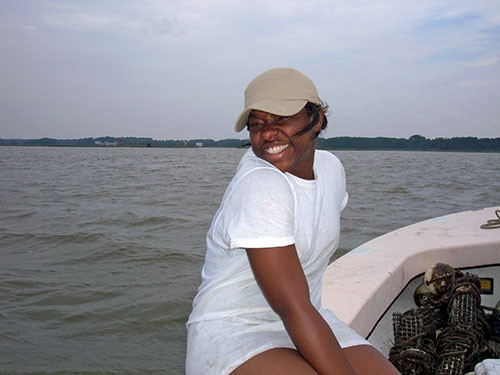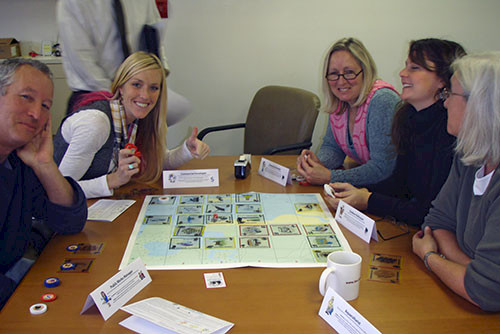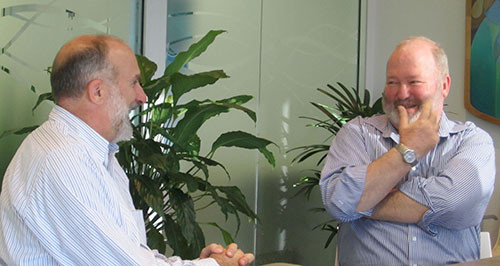Having fun while developing an environmental philosophy
Bill Dennison ·'Having fun' refers to enjoying the journey of an environmental campaign. Environmental issues are typically serious business and people burn out by being serious all the time. Having fun conjures up images of smiles and chuckles. Having fun warms the heart, and makes the experience more memorable. Having fun can inspire people and make them want to do more. We need to employ an 'eco-psychology' to be more effective, with a self evaluation: Did I enjoy myself? Would I want to do more?
There are various approaches to having fun and the following table provides activities to address the hands, head and heart aspects of having fun through expression, experiences and excellence:
| Expressing | Experiencing | Excelling | |
| HANDS | Physical humor; getting muddy, dirty, and wet, being silly, wearing silly clothes, making gestures | Group activities; field trips, group projects, singing and dancing | Sense of accomplishment; applying skills to new situations, overcoming obstacles and fears |
| HEAD | Games & activities; playing, play acting, topical and relevant activities | Learning; increased knowledge through reading, lectures, data analysis | Catalytic validity; ability to inspire others to change the way they think |
| HEART | Respectful & kind; humor with love, self deprecating, not poking fun at other's expense | Friendships; opportunities to share experiences and life experiences, teamwork, share meals | Personal growth; developing a philosophy for growth, reflecting on actions and impacts on others |
Hands: Physical humor is universal. A timeless activity that always serves to invoke a smile is when people get muddy, dirty and/or wet. Field trips that involve getting muddy, dirty and/or wet often become memorable. A strategy that Captain Cook invoked when his men were sent ashore to collect freshwater was to immediately have the men stand in waist deep water. This way they did not waste time or risk injury when trudging upstream to access freshwater. How many times have you carefully avoided mud or water only to eventually become dirty and/or wet, and then joyfully splashed along once already soiled? Another aspect of physical humor is being silly by acting silly, wearing silly clothes or making silly gestures. Physical humor has the advantage of being language and culture independent.
Hands: Group activities to connect people. Field trips are an excellent way to conduct a group activity while experiencing nature. Group activities offer many dimensions of formal learning, through instructors but also importantly through interactions with fellow students. Group field trips also allow for informal learning experiences, particularly when a diverse group makes different expertise available to group members (e.g., bird expert, tree specialist). Working together as a team on a group project can facilitate team building, build confidence and result in a whole which is greater than the sum of the parts.

Hands: Developing a sense of accomplishment. It can be fun to finish projects and gain a sense of accomplishment. By applying your skills to a new project and achieving a satisfactory end result, you can create a lasting positive attitude about the project and enjoy the process enough to want to tackle another project. There is something quite satisfying about overcoming obstacles and tackling new challenges. Overcoming personal fears about undertaking something new and different serves to build confidence and self-assurance. The fun part of this accomplishment is in the self actualization that occurs by overcoming fears.
Head: Playing games and activities. There are many studies which show that playing games provides an excellent form of training. The intellectual aspect of playing games is often not recognized by the participants, as they are having too much fun to notice that they are actually learning something. Having competitions for prizes or recognition can enhance the games, but simply playing games is often sufficient motivation. Play acting can be a good game to draw out the different roles and responsibilities that different sectors of society have regarding environmental issues, and some latent acting talents may be revealed. Topical and relevant games need to be utilized in a teaching environment, for example, the game "Conceptionary' used to help teach science communication.

Head. Learning and gaining knowledge. The act of learning is inherently fun. Knowing more than when you started, more than your neighbor or more than the average person provides a positive reinforcement for learning. Being 'on the inside' with knowledge that not everyone else possesses allows you the opportunity to be better informed and you are often eager to share this knowledge with friends and family. The acquisition of environmental knowledge can come from personal observation, reading, attending lectures, or analyzing data. Regardless of the source, gaining new knowledge is a 'heady' experience.
Head: Catalytic validity - changing the way people think. The ability to inspire others to change the way they think is known as 'catalytic validity'. Since effective environmental management often invokes behavior change, there is a need to change the way people think about an issue in order to convince them to change their behavior. This convincing can be done through a variety of means, e.g., leading by example, providing compelling arguments, or by exerting peer pressure. The fun aspect of catalytic validity is figuring out which approach to take and the satisfaction of succeeding in connecting to people and knowing that by doing so, you have made a difference.

Heart: Respectful and kind humor. Humor can be cruel and demeaning, especially when it is at someone else's expense. In contrast, respectful and kind humor can be both funny and inclusive - serving to bind people together. Self-deprecating humor is particularly useful to break the ice in establishing new relationships and in allowing everyone to share in the laughter. Topical and relevant humor is needed, rather than one-liners out of context. Humor can alleviate tense situations, provide strong memories and help forge positive personal relationships.
Heart: Developing friendships. Working together on various projects creates opportunities for people to share experiences and forge new friendships. Friendships which spring out of teamwork can reinforce the group dynamic. The trust and sharing that friendships provide gives people positive reinforcement for continuing their involvement in an environmental program. Friendships can catalyze new and different projects. The friendship that sprung out of Peter and Bill working together on an environmental project (e.g., The rise of the slime) is what promoted the creation of the book Dancing with Dugongs: Having fun and developing a practical philosophy for environmental teaching and research, which will be released at the 2013 Riversymposium in Brisbane, Australia. Friendships can be fostered by using teamwork based approaches to problem solving, sharing meals and/or accommodations, and providing opportunities for self directed project development, which allow self assembled groups of people to tackle issues.

Heart: Personal growth opportunities. The personal growth that can come from tackling important problems and working collaboratively can be a very satisfying experience. Allowing for time to reflect on your actions and assessing your impact on others can promote personal growth. Recognizing personal achievement, particularly by using metrics that demonstrate progress or by realizing your impact either through testimony of colleagues or personal realization can enhance personal growth. Creating personal growth opportunities is an important management tool. These opportunities require mentoring but also need to allow for experimentation and not penalize failure too severely.
About the author
Bill Dennison

Dr. Bill Dennison is a Professor of Marine Science and Vice President for Science Application at the University of Maryland Center for Environmental Science.

